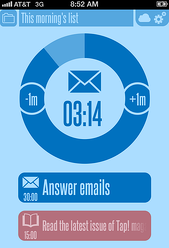With December comes onslaught of holiday advertising that interrupts our favorite TV shows. Smartphone  manufacturers have filled much of this coveted airtime with tableaus of super users who seem to float through life efficiently and stress-free. After all, their smartphones do everything for them. Time management, organization and a wide variety of Executive Function skills are now easily automated with smartphones. Thanks to their creative-bordering-on-genius marketing strategy, we may find ourselves wistfully thinking If only I had that phone. I’d feel more in control. My life would have more balance. As an Executive Function coach, parents sometimes ask me, "Can smartphones help build Executive Function skills?"
manufacturers have filled much of this coveted airtime with tableaus of super users who seem to float through life efficiently and stress-free. After all, their smartphones do everything for them. Time management, organization and a wide variety of Executive Function skills are now easily automated with smartphones. Thanks to their creative-bordering-on-genius marketing strategy, we may find ourselves wistfully thinking If only I had that phone. I’d feel more in control. My life would have more balance. As an Executive Function coach, parents sometimes ask me, "Can smartphones help build Executive Function skills?"
As a loyal iPhone user since the days of 2G EDGE, I’m confident in saying that simply possessing a smartphone does not make all of life’s time management and organizational struggles magically disappear. Don’t get me wrong, I believe everyone past a reasonable age can benefit from having a smartphone (and a dog…but that’s a debate for another day)—but the truth is that a smartphone is an investment. Not just of the financial sort, but in the sense that it takes time, effort and no small amount of reflection to set up your smartphone with a system that will give YOU what you need.
It’s safe to say that the majority of the students I work with are challenged in some way by time management and organization. These Executive Function skills are essential in a world where work, school, extracurricular, social and family commitments seem to surpass those seven finite days we are given each week. In an effort to live by example, I’m always looking for new ways to manage my time and to keep all of life’s moving pieces in order. Of course, it doesn’t hurt that I’m easily dazzled by new apps and devices! Check out an app that I’ve been finding some real value in…
30/30
 This free, flexible process timer helps me bridge the expanse between making a plan and actually seeing it through to completion. Using a series of gestures I create a list of tasks and their corresponding time limits. Different task lists meet different needs. Sometimes I choose to list a series of short tasks, such as emails, filing or proofreading that can be accomplished in a well-executed hour. If I’m working on a longer task, however, then I can build in breaks to alternate with chunks of work time. Once I start the 30/30 timer, the app will tell me when it’s time to move on to the next step, so I forge ahead to meet that “deadline.” There is also a feature to add or remove small increments of time from the current task. Over time this helps me make more accurate estimates of how much time it will take to complete particular items.
This free, flexible process timer helps me bridge the expanse between making a plan and actually seeing it through to completion. Using a series of gestures I create a list of tasks and their corresponding time limits. Different task lists meet different needs. Sometimes I choose to list a series of short tasks, such as emails, filing or proofreading that can be accomplished in a well-executed hour. If I’m working on a longer task, however, then I can build in breaks to alternate with chunks of work time. Once I start the 30/30 timer, the app will tell me when it’s time to move on to the next step, so I forge ahead to meet that “deadline.” There is also a feature to add or remove small increments of time from the current task. Over time this helps me make more accurate estimates of how much time it will take to complete particular items.
Even with many facets of my life conveniently maintained within iOS, I still don’t claim to be a super user. But I will claim to know the answer to what makes my smartphone so smart. I do. My smartphone is smart, because I set it up to meet my individual needs, which in turn keeps me more organized and efficient. Smartphone apps help me and the students I coach develop stronger Executive Function skills. It’s not always easy, but it works. And you can do it, too.
How do you make your smartphone work for you?
Want to learn more about how academic coaching can help your child use smartphone apps more effectively and learn other strategies for success in school? Click here.
photo credit: Olgierd Rudak via flickr
